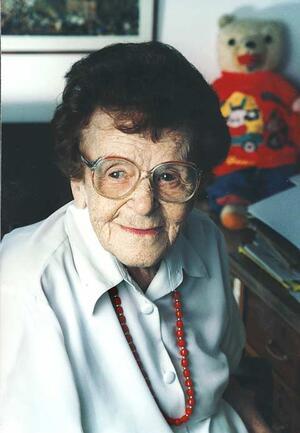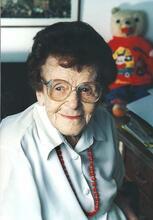Yemima Tchernovitz-Avidar
Born in Lithuania to a family that celebrated Jewish culture and the Hebrew language, Yemima Tchernovitz-Avidar grew up with a deep appreciation for Jewish literature. She moved to Jerusalem at the age of twelve and later to Tel Aviv. She taught at numerous schools and later studied education at the Universities of Berlin and Vienna. For thirteen years she taught as a nursery school teacher and principal in Tel Aviv and encouraged her students to have patriotic values. During this time, she also began translating broadcasts for children. As a school teacher, Yemima wrote children’s stories; by the time she died, she had published over forty and had become a staple in modern Hebrew literature. Her works are simple and familiar. Although they often draw on serious themes such as war and illness, they remain optimistic and energetic.
Early Life
Yemima Tchernovitz-Avidar was born in Vilna, Lithuania, in October 1909, the daughter of Samuel Tchernovitz (1879–1929) and Bella (née Feldman) Tchernovitz (1882–1928) and sister of Jacob and Alexander (later Tsur). Her father, whose pen-name was Sfog (Sponge), was one of the editors of Ha-Zefirah, Ha-Am, and Olam Katan, and also wrote for other Hebrew and Yiddish-language newspapers. He was the author of essays, literary criticism and monographs.
From early childhood Yemima imbibed the Jewish culture of her parents’ home, where Hebrew was the spoken language. She attended the Hovevei Sefat Ever (Society of Lovers of Hebrew) kindergarten in Moscow and in 1921, at the age of twelve, arrived in Palestine after months of wandering via Kiev and Warsaw. Before the family returned to Jerusalem, Yemima attended school in Bet Gan (Lit. "village." The dominant pioneer settlement type of the Jews in Palestine between 1882moshavah founded in 1903; eastern Lower Galilee), where an aunt who had come to the country some ten years earlier lived. In Jerusalem she first attended the Lemel School and then the Gymnasia Ha-Ivrit. In 1925 she moved to Tel Aviv with her family, completing her schooling at Herzlia Hebrew Gymnasia in 1928. Her mother died in 1928 after suffering a prolonged lung disease. A year and a half later, her father succumbed to malaria.
Teaching Career
After finishing school, Yemima began teaching at the Beit Hinnukh li-Yaldei Ovdim (The School for Workers’ Children) alongside poet and editor Aaron Ze’ev (1900–1968), with whom she published children’s booklets called Tzitz (Blossom). At the same time, she participated in a children’s theater studio under the direction of Zevi Friedland (1898–1967) and also wrote plays for the studio. From 1931 to 1932 she studied education (primarily special education and psychology) with Charlotte Bieler, Alfred Adler (1870–1937) and Anna Freud at the Universities of Berlin and Vienna, completing her studies at the Jugendheim in Berlin. In Vienna she met Yosef Rochel (1906–1995), who had come there for medical treatment after losing his right hand in a grenade explosion during Haganah training exercises. They married in 1932 and upon their return to Palestine settled in Tel Aviv.
From 1932 to 1945 Yemima served as a nursery school teacher and principal for the Tel Aviv municipality, particularly in the suburbs. Her nursery school was a model of educational pioneering, inculcating national and social values at a time when there was as yet little experience in the field of education. Throughout these years she regularly participated in the Children’s Hour and other programs of Kol Yerushalayim (Voice of Jerusalem), translating and adapting broadcasts for children and young people. She served on the board of the Nursery School Teachers’ Theater, adapting plays for performance, and also on the editorial boards of Hed ha-Gan (Nursery School Echo) and Devar ha-Po’elet, a publication for women workers. She fulfilled the duties of wife of Israel’s ambassador, first in Moscow (1955–1958) and then in Buenos Aires (1961–1964).
Writings
Yemima began writing in early childhood. After her death, her family discovered six diaries in fluent Hebrew, the first, dated Kiev 1919, written when she was ten years old. The diaries are full of attempts at composing fables and other literature. When she was fourteen, the New York children’s paper Eden published her story “On the Mount of Olives.” While working as a nursery school teacher she wrote her first stories for children (Stories for Rama, Mischievous Mookie, Kushi and Nushi), most of which first appeared in Devar li-Yeladim. Her first book, Stories for Rama, appeared in 1936 and from then until her death she published more than forty additional books, all of which went into several editions. Among them was Shemonah be-ikvot Ehad (Eight in Pursuit of One). First published in 1945, it had a new edition in 1995 and was selected as Israel’s most popular children’s book during the country’s jubilee in 1998. Her works were translated, dramatized, filmed and televised, produced in video format and adapted as games. She also translated such children’s classics as The Wizard of Oz, Pinocchio, Alice in Wonderland, Andersen’s Tales and Cinderella. Hundreds of articles and reports from Palestine and from her stays abroad appeared in both daily newspapers and children’s publications in Palestine and elsewhere. She wrote regularly for Devar li-Yeladim, Davar, La-Isha (in its early years, under the pseudonym Bat-Zion), Ma’ariv and Devar ha-Po’elet.
Family Life and Influence
With the establishment of the Israel Defense Forces in June 1948, her husband Yosef, who was then a brigadier-general, changed his name to Avidar, an acronym based on the names of his daughters: Dana (b. 1939) and Rama (b. 1933). From 1953 the family lived in Jerusalem, where Yemima died on March 20, 1998.
Yemima Tchernovitz-Avidar’s works became classics of modern Hebrew children’s literature. She was among the first authors to draw their subject matter from the everyday lives of the country’s youngsters. The protagonists of Eight in Pursuit of One are children firmly rooted in the life of the country, whose relationships and habits enable readers to empathize and identify with them. Her other books are likewise marked by simplicity and verisimilitude of plot, their setting in the country’s landscape and everyday life, and their mixture of suspense and realistic characters. Her books for younger children, which also draw on their everyday lives and familiar surroundings, are full of animals and plants, personification of toys and other objects. Although they frequently deal with such painful experiences as illness, separation, war and death, they are nevertheless full of optimism and excitement. Her works have clear educational content, conveying human, national and social values in a natural manner. Her language is plain and her style fresh and clear, devoid of hyperbole, modern and colloquial, with images drawn from the Israeli child’s immediate surroundings. However, she also drew in a flexible and fluent manner on the language of the Bible and other classical texts. In this way she contributed greatly, from the 1930s on, to young people’s ability to read classic Hebrew sources.
Yemima Tchernovitz-Avidar was awarded the Aaron Ze’ev Prize for Children’s Literature in 1983 and the Israel Prize in 1984. In 1992 she was made an Honorary Citizen of Jerusalem. Her archive and complete list of publications can be found in the Genazim Biobibliographical Institute of the Association of Israel Writers in Tel Aviv. Merkaz Yemima (The Yemima Center for Research on and Teaching of Children’s Literature) was established in 1985 at the Beit Berl College. It includes a library with forty-five of her books and a complete list of publications. The Center serves as a meeting place for authors of children’s literature and also produces publications, including a magazine named after one of Yemima’s books, Be’emet? (Really?).
In 2003 Yemima's Secret Diaries were published in Tel Aviv (Hebrew), edited and with notes by Rama Zuta.
Ofek, Uriel. Give Them Books: Selected Children’s Literature (Hebrew). Tel Aviv: 1978; Tsur, Jacob. Yesterday’s Dawn (Hebrew). Tel Aviv: 1965.




